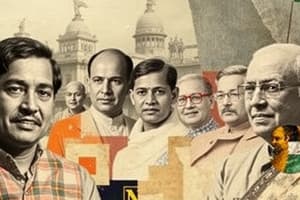Podcast
Questions and Answers
What happens after the Lok Sabha elections are over?
What happens after the Lok Sabha elections are over?
- The ruling party is determined
- The party with the majority of MPs is determined (correct)
- The opposition party is determined
- The Prime Minister is selected
Who becomes the Prime Minister of India?
Who becomes the Prime Minister of India?
- The Deputy Minister
- The leader of the opposition party
- The leader of the ruling party (correct)
- The Minister of State
What is the role of the Council of Ministers?
What is the role of the Council of Ministers?
- Implement government decisions and laws (correct)
- Choose the Prime Minister
- Select MPs
- Make laws
Who forms the opposition in the Parliament?
Who forms the opposition in the Parliament?
What is the function of Cabinet Ministers in the Council of Ministers?
What is the function of Cabinet Ministers in the Council of Ministers?
What is the main responsibility of Ministers of State in the Council of Ministers?
What is the main responsibility of Ministers of State in the Council of Ministers?
Who generally does not hold a separate charge of a department in the Council of Ministers?
Who generally does not hold a separate charge of a department in the Council of Ministers?
What determines if a party has a majority in the Lok Sabha?
What determines if a party has a majority in the Lok Sabha?
Flashcards are hidden until you start studying
Study Notes
Lok Sabha and Executive Selection
- The Lok Sabha selects the executive, which is responsible for implementing laws and running the government.
Post-Election Process
- After the Lok Sabha elections, the party with the maximum number of MPs is determined to have a majority.
- A party must have half or more MPs to have a majority.
- The party with the majority is called the ruling party and is invited to form the national government.
Government Structure
- The leader of the ruling party becomes the Prime Minister of India.
- The Prime Minister chooses ministers to help implement the government's decisions and laws.
- These ministers are known as the Council of Ministers.
Council of Ministers
- The Council of Ministers includes Cabinet Ministers, Ministers of State, and Deputy Ministers.
- Cabinet Ministers usually hold independent charge of a department.
- Ministers of State can either hold independent charge of a department or work under a Minister of Cabinet rank.
- Deputy Ministers generally do not hold separate charge of a department and work under Cabinet or State Ministers.
Ministerial Roles
- The Prime Minister assigns charge of different departments (portfolios) to the Council of Ministers, such as industry, finance, power, etc.
Studying That Suits You
Use AI to generate personalized quizzes and flashcards to suit your learning preferences.




